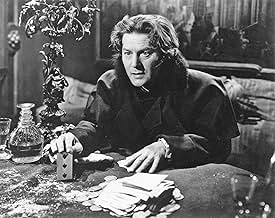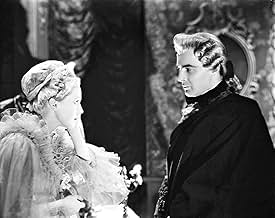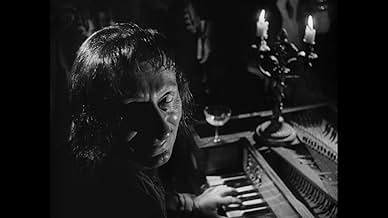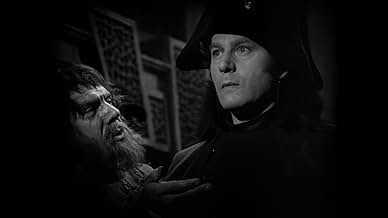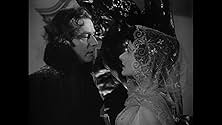An army officer becomes obsessed with learning the secret to a card game for which an elderly countess sold her soul years earlier.An army officer becomes obsessed with learning the secret to a card game for which an elderly countess sold her soul years earlier.An army officer becomes obsessed with learning the secret to a card game for which an elderly countess sold her soul years earlier.
- Director
- Writers
- Stars
- Nominated for 1 BAFTA Award
- 3 nominations total
- Countess's Lover
- (as Yusef Ramart)
- Director
- Writers
- All cast & crew
- Production, box office & more at IMDbPro
Featured reviews
This lavish, spooky and slow burning telling of Pushkin's short story is filmed in dark, shadowy rooms rather like one of Universal's gothic horror films of the thirties. Walbrook is excellent as the desperate, almost maniacally obsessed man out to find the great life secret and Evans is on top form as the grumpy, intolerable countess who has lost her soul. Where the film particularly excels is in the last 30 minutes where there are a number of genuinely chilling supernatural scenes as a ghost haunts Walbrook leading up to a climactic card game, where having learned the secret, he risks all. Spooky and unique in its way - there are no other films that I can recall that are like this.
I was fortunate enough to see it on cable, where by coincidence it was shown right after 'The Third Man' and just before another Brtish b/w masterpiece, 'The Haunting' -- what a triple bill! In fact there are several connections between QOS and 'The Haunting', including Jack Clayton, who produced the former and directed the latter, and composer Georges Auric, who scored both. There are also close connections with The Archers (Powell & Pressberger) -- Anton Walbrook featured in three P&P films, and co-writer Rodney Ackland also scripted one of those films, P&P's '49th Parallel'.
Watching 'Queen Of Spades' it's obvious that many of the team who made it learned their craft in the silent era -- lighting, costumes, set design and cinematography are all fantastic, and though on a slightly smaller and more restrained scale, QOS is almost on a par with Von Sternberg's baroque masterpiece 'The Scarlett Empress'.
Brilliantly directed by Torold Dickinson (who also did 'Gaslight', in which Walbrook also features), the incredible, wildly expressionistic b/w cinematography is by legendary Czech-born DOP Otto Heller, who began his career in 1922(!) and who also shot Olivier's 'Richard III', 'The Ladykillers', Powell's 'Peeping Tom' and those three classic Michael Caine films of the 60s, The 'Ipcress File', 'Alfie' and 'Funeral In Berlin.'
The casting is perfect, and it's easy to see why Anton Walbrook was one of Michael Powell's favourite actors. His portrayal of the odious Suvorin is a tour de force, and he is matched by the great Edith Evans as the Countess. The crucial scene in which Suvorin tries unsuccessfully to beg, cajole, and finally force the secret of the cards from the Countess is truly electrifying -- Walbrook is absolutely rivetting, and Evans -- who has no lines and plays the scene only with her eyes -- shows why she was considered one the greatest actors of her generation. The climax of that scene, the look of stark horror on Walbrook's face, is one of the most powerful film moments I've ever seen, perhaps only surpassed by incredible card-game scene at the end of the film.
I don't know why this film is so unknown. It reminds me a little of "The Haunting" based on a Shirley Jackson novel, in that one is never really sure if supernatural activity is really going on, or if the main character has finally lost his mind and is imagining everything. I long for the day when this film reappears on video.
The story is based on Alexander Puschkin's novella, "The Queen of Spades (1834), about a young captain in the Russian army (Anton Walbrook), an outsider (because he's German) who secretly covets the wealth and position of his fellow officers. When he discovers that an aged countess has sold her soul to the devil in exchange for eternal fortune at the card table, he attempts to gain entry to the household by seducing the countess' naive ward, but his envy envy leads to the dowager's death, a loveless marriage, and Herman's descent into madness.
The production initially ran into some trouble with director Thorold Dickinson entering the project when a great deal of the pre-production was already done. With his limited resources and the inadequate sets and sound stage facilities of the Welwyn Studios, he incorporated as many camera, lighting and special effects as he could devise, and with good effect. The film looks great. Atmosphere in these kind of films is half the work, and they surely did a great job. The acting is somewhat stagy and highly stylized, but this was probably a common characteristic in British acting in those days, and I don't think of Anton Walbrook as a great actor, but the rest of the cast is fine, with Edith Evans in great form as the countess. All in all, not an undiscovered masterpiece, but a fine British chiller with a great period atmosphere.
Camera Obscura --- 8/10
Did you know
- TriviaThe studio was right beside a train line and very badly sound-proofed. They had to post a man on the studio roof to watch out for trains so filming could be suspended while the trains went past.
- Quotes
Capt. Herman Suvorin: [he surprises the Old Countess] Don't cry out! Don't be alarmed, please, don't be alarmed. I don't mean you any harm. I've come to ask a favour of you. That's all. A favour. It'll cost you nothing. But to me, it will bring happiness for the rest of my life. I want the secret of the cards. That's all. Come, what is it? The three cards. The names of the three cards. Please! Oh, it's no use pretending you don't know anything about it. I know you were given the secret. And I know who gave it to you. Please! Just think those three words aloud. And I'll trouble you no more. I'll go. What good is the secret to you? For whom are you keeping it? For your grandson? He's rich enough. What would another fortune mean to him, a wastrel and a spendthrift? But I'm not a man of that sort. I know the value of money. I could do great things, I tell you. Great things! If only I had money.
Capt. Herman Suvorin: [sinking to his knees, he continues] For the love of God! If you've any human feeling in your breast, you can't refuse me. I beg. I beseech you. I know why you won't speak. The secret is connected with some terrible sin. That's it, isn't it? I'll make a bargain with you; tell me your secret and I'll take your sin upon my soul. Do you hear me? I mean it. A bargain. I'll take your sin upon my own soul. Oh, speak! Speak to me! You old sphinx.
Capt. Herman Suvorin: [he brandishes a pistol and continues] By God, I'll make you. I ask for the last time, are you going to tell me the secret of the cards? Or are you not?
- Crazy creditsThe opening credits, rather than simply reading "Screenplay By", "Music By", "Director of Photography", etc., as in most films, read "The Screenplay By", "The Music By", "The Director of Photography", "The Art Director", etc.
- ConnectionsReferenced in Lettre de Sibérie (1958)
- How long is The Queen of Spades?Powered by Alexa
Details
- Release date
- Country of origin
- Official site
- Language
- Also known as
- The Queen of Spades
- Filming locations
- Production companies
- See more company credits at IMDbPro
- Runtime
- 1h 35m(95 min)
- Color
- Aspect ratio
- 1.37 : 1



